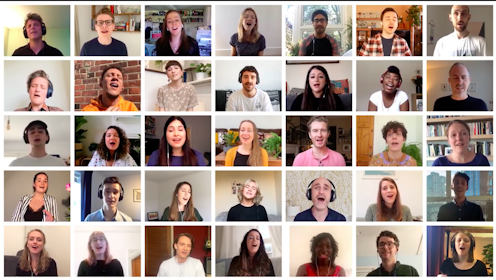A song in your heart shouldn't lead to an infection in your lungs: reasons to get with online choirs
- Written by Narelle Yeo, Senior Lecturer in Voice and Stagecraft, Sydney Conservatorium of Music, University of Sydney

On March 10 2020, Skagit Valley, Washington – a town with no known cases of COVID-19 – held a choir rehearsal. There was hand sanitiser at the door, no direct contact between choristers, no-one coughed or was ill.
Out of the 60 choristers in attendance, at least 53 became ill and two have died from COVID-19 complications.
On March 8, a 130-person choir performed at the Concertgebouw in the Netherlands. Four people associated with the choir died, and 102 fell sick.
German churches are reopening but regulating public singing after 59 out of 78 singers at a March rehearsal of the Berlin’s Protestant cathedral choir were infected with coronavirus.
Singers are highly attuned to the dangers of respiratory illness because of its impact on the voice, with inflammation and excess mucus impacting vocal quality. Despite this natural hyper-vigilance, choirs have been super-spreaders of coronavirus.
Ear, nose and throat specialist Dr Lucinda Halstead, speaking to America’s National Association of Teachers of Singing, has proposed a ban on choral singing until there is a vaccine and treatment with 95% efficacy in place. In her estimates, this is between 18-24 months away.
Singers inhale more air and exhale at greater air and moisture volume than speakers. Singing produces six times the amount of airborne droplet nuclei (aerosolised virus particles which can remain suspended in the air) compared with speech.
Live ensemble singing presents a higher health risk for coronavirus. Safe singing may require larger spaces and protocols than are possible in practice.
Dr William Schaffner, professor of infectious diseases at Vanderbilt University, advises avoiding singing in groups. He told Business Insider: “We don’t want people doing voice lessons, even standing eight-and-a-half feet apart.”
Online benefits
Choirs rehearsing online without specialised equipment may notice a 15-20 millisecond latency. Try to sing a song together with your friends on Zoom and you will experience this hilarious and frustrating problem.
But brilliant visual creations of multiple singers can hide this. The best choir videos are edited together to sync performances and give the appearance of ensemble singing.
A virtual choir can:
maintain an existing choir by recording and editing individual sung parts to combine voices and visuals into the appearance of ensemble singing
allow members to practise singing, as musical skills require repetitive practice
maintain community while social isolation is a real danger
improve mood and “immune competence”
support musicians through paying conductors.
Returning to group rehearsals
As social restrictions ease, choirs will need to consider the conditions to return to safe rehearsals, following government advice for the general population.
Enhanced distancing measures for singers should be considered, including:
separation of singers – having members stand further apart and applying direction principles to minimise aerosol, droplet and touch transmission
using internal spaces with natural airflow (no air conditioning or re-circulation), or outside spaces with natural air circulation
limiting participants.
Choirs could find innovative locations to achieve these aims. Singing in an environment with natural resonance such as a beautiful outback chasm could create special experiences for choirs without losing quality or sacrificing health. Such imperfect live magic could supplement the online magic of virtual choirs.
Live choirs could also wait. Medical advice is to avoid singing in close proximity until further research has been done or the pandemic is controlled. While choristers need close proximity for part recognition, creating blend and a raft of well-being measures, these weigh heavily against health risks.
Authors: Narelle Yeo, Senior Lecturer in Voice and Stagecraft, Sydney Conservatorium of Music, University of Sydney





